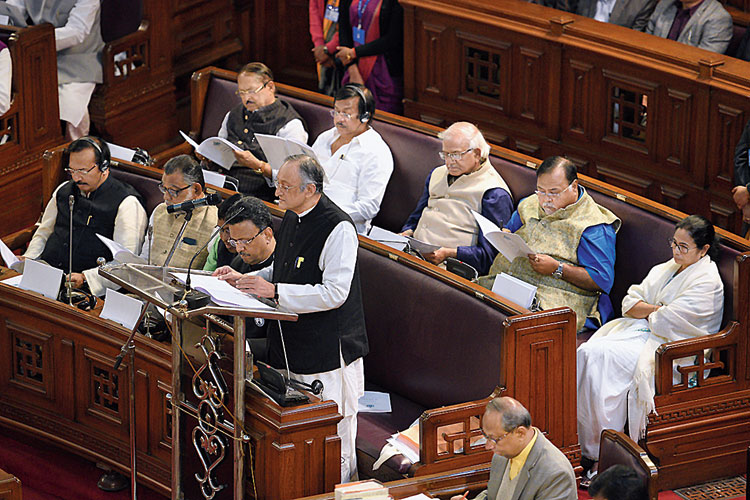The Bengal government on Monday announced a new scheme under which funds will be provided to permanent workers of tea estates to build homes in the next three years and allocated Rs 500 crore for the coming fiscal.
However, finance minister Amit Mitra’s budget, in which the Chaa Sundari scheme was announced, didn’t mention if the homes would be built on tea estates or other plots.
Workers have no right to the land on which they live in tea gardens. Their longstanding demand for land rights was not mentioned in the budget.
“I am happy to announce a new scheme ‘Chaa Sundari’ under which within next three years the state government will provide funds for construction of housing for all those permanent workers who do not have house of their own,” Mitra said in his budget speech.
Ahead of the announcement, the finance minister has said there are around three lakh permanent workers in 370-odd tea gardens in Bengal and most of them belong to the Scheduled Castes. He said around 50 per cent of the labourers are women.
Asked about the scheme, Prabir Bhattacharjee, secretary general, Tea Association of India, said: “We are waiting for details of the project, particularly in respect of land that would be utilised for construction of houses.”
A senior planter based in Siliguri said if the state wanted to build the houses on the land leased out to tea estates, it would be a complicated issue.
“First of all, the state government will have to ensure that the company that runs the tea estate is ready to relinquish the land for the government. Secondly, if permanent houses are built for workers and the ownership is provided to them, then in due course, the tea company might find it tough to find space to build quarters for new workers. It is not clear whether the state will provide funds to those workers who own land,” he said.
The only probable solution, he said, is to build houses on unused government land in the Terai and the Dooars. It would however be a problem to find such land in the hills, he added.
“Unused plots are not available next to each garden. It would be interesting to see whether a worker would want to move out of the garden, if he is offered a house that is 15 or 20km away,” a trade union leader said.
The tea industry, however, unequivocally welcomed the announcement in the budget that the state would continue to waive agricultural income tax on tea for two more fiscals.
Political observers believe the sops for the tea sector are aimed at political dividends.
“There are at least 15 Assembly seats in north Bengal where votes of tea garden dwellers decide the fate of candidates. That is why it seems Mamata Banerjee is focussing on the tea belt,” said a political observer.
Trinamul insiders said two other announcements by Mitra — old age pensions for the SCs and the STs — could help the party revive its support base in north Bengal.
“Out of 54 Assembly seats in north Bengal, at least 10 seats are reserved for the STs and around 20 seats are reserved for the SCs. The pension schemes, if implemented in a proper manner, can help us woo adivasis who mostly live in tea gardens and forest villages and Rajbanshis,” said a Trinamul leader in Siliguri.
The budget also showed marginal rise in allocations for two state departments which spend major funds in north Bengal. The north Bengal development department has been allocated Rs 710 crore which was Rs 660 crore in the current fiscal. The allocation for tourism department is Rs 400 crore for 2020-21, higher by Rs 30 crore for the current financial year.











